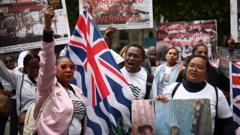In a significant move, UK Prime Minister Sir Keir Starmer has finalized a £101 million-a-year deal to transfer sovereignty of the Chagos Islands to Mauritius while leasing back the crucial military base on Diego Garcia. During a press conference, Starmer emphasized that the agreement is vital for the long-term operation of the base, which is deemed crucial for UK national security amidst growing global tensions.
The pact, which has a term of 99 years with a potential 40-year extension, allows the US and UK to continue military operations on Diego Garcia for the foreseeable future. Starmer expressed, "If we fail to act now, we risk ceding control to nations such as China." Critics within the Conservative Party labeled the agreement "national self-harm," arguing that it exposes the UK to external threats by aligning with Mauritius, a country with strong ties to China.
This agreement comes after a near-block as two Chagossian women sought legal recourse to prevent the transfer without their consent. Although their challenge failed, it raised significant concerns about the rights of the Chagossian people, who were displaced decades ago. According to the pact, Mauritius is authorized to manage resettlement on the islands (excluding Diego Garcia), a move seen as a potential return to the homelands for some Chagossians.
The deal has been met with mixed reactions from the Chagossian community, with some celebrating its potential benefits, while others express skepticism about their future treatment under Mauritian governance. Chagossian leader Olivier Bancoult called it a "historic day," hopeful for a reconnection with ancestral lands.
The timeline for the agreement to take effect hinges on approvals from both the UK and Mauritian parliaments, but the discussions surrounding it reflect the intricacies of colonial legacies, international law, and human rights. As Chagossians advocate for their voices to be heard, the implications extend beyond geography, influencing the dynamics of national identity and international politics in an increasingly interconnected world.


















